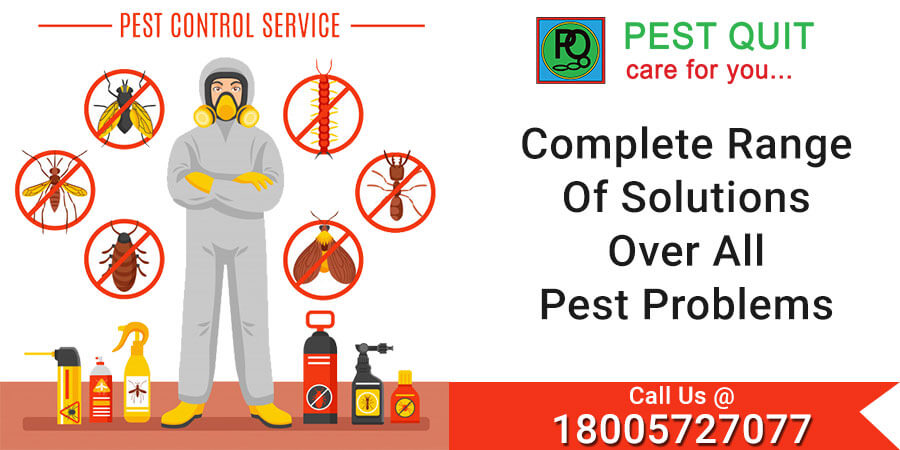Pest Control Auckland: Superior Providers for a Pest-Free Atmosphere
Wiki Article
Comprehending Different Sorts Of Pest Control Methods and Their Effectiveness
When taking into consideration pest control approaches, it is crucial to comprehend the diverse techniques available and their varying levels of effectiveness. By checking out the nuances of these parasite control methods, a comprehensive understanding of exactly how to resolve insect concerns can be developed.Chemical Parasite Control Methods
Chemical pest control techniques play a critical duty in properly managing and eliminating pest problems in numerous settings. One of the crucial benefits of chemical parasite control is its capacity to give fast and targeted options to pest issues. Pest Control Auckland.Nevertheless, it is vital to consider the potential risks and downsides connected with chemical bug control techniques. Overreliance on chemicals can cause the advancement of pesticide resistance in pests, making them harder to regulate over time. Furthermore, the use of certain chemicals can have harmful effects on non-target microorganisms, the atmosphere, and human health otherwise used properly.

Organic Insect Control Approaches
Utilizing all-natural predators and virus to manage parasite populations effectively, biological parasite control techniques offer a eco-friendly and lasting method to pest monitoring. By promoting the task or presenting of organisms that normally victimize or contaminate insects, such as ladybugs for aphid control or particular bacteria for caterpillar problems, biological control can assist keep pest populations at convenient levels without the requirement for synthetic chemicals. This technique is particularly useful for chemical-free farming methods, as it avoids making use of potentially hazardous materials while keeping crop wellness.
Physical Parasite Control Approaches
While organic pest control approaches concentrate on using all-natural predators and pathogens, physical pest control approaches make use of physical and mechanical barriers to manage parasite populaces. These techniques are frequently considered eco pleasant as they lessen using chemicals. Physical pest control consists of methods such as trapping, making use of barriers like screens or webs, and literally eliminating pests from the area.Catches are generally utilized in physical pest control to capture and get rid of parasites like rats and pests. These catches can be baited with food or scents to draw in the insects, leading them to an included area where they can be conveniently taken care of. An additional physical technique is using barriers such as displays, fences, or internet to stop parasites from entering or infesting specific locations. For instance, setting up great mesh displays on home windows can help shut out insects and flies.
All-natural Insect Control Approaches
Including all-natural killers and plant-based repellents is a crucial approach in carrying out efficient all-natural bug control techniques. By motivating the existence of valuable insects like ladybugs, lacewings, or predatory mites, gardeners can normally manage pest populations. These predators feed on common yard parasites such as aphids, caterpillars, and termites, assisting to maintain a well balanced ecological community without the demand for chemical treatments.
Moreover, executing social methods such as crop rotation, friend growing, and preserving correct plant health can also enhance the performance of natural insect control methods. These methods not only assist in avoiding parasite invasions yet also advertise biodiversity and overall ecological community resilience. By incorporating these natural strategies, individuals can properly manage bugs while decreasing environmental impact.
Integrated Pest Administration (IPM) Strategy
Executing an Integrated Parasite Management (IPM) technique is important for successfully controlling insect populaces while minimizing reliance on chemical pesticides. IPM is a detailed and lasting strategy that integrates different pest control methods to accomplish long-lasting options. This strategy concentrates on control, avoidance, and monitoring to resolve pest issues in an environmentally friendly way.IPM integrates biological, social, physical, and mechanical methods with the limited and critical usage of pesticides when essential. By highlighting aggressive measures such as environment alteration, biological control, and exemption, IPM intends to decrease bug populaces and their influence on the ecological community. Normal surveillance is critical in IPM to analyze pest degrees properly and establish one of the most proper control techniques.
One of the key advantages of IPM is its capacity to lessen the dangers connected with excessive pesticide usage, such as ecological contamination and damage to non-target organisms. In addition, IPM advertises a much more holistic strategy to pest administration by thinking about the overall ecosystem characteristics. In general, the IPM approach supplies a efficient and sustainable solution for parasite control while advertising environmental responsibility.
Verdict
To conclude, understanding the various types of parasite control techniques and their effectiveness is critical in successfully managing bug infestations. Chemical, organic, physical, and natural bug control methods each have their very own advantages and restrictions. Integrated Insect Administration (IPM) technique, which integrates various methods for sustainable pest control, is increasingly being identified as a alternative and environmentally friendly remedy. By making use of a mix of these companies, techniques and people can properly control bugs while lessening damage to the environment.Chemical pest control approaches play an essential role in effectively managing and removing pest invasions in various environments.Making use of natural killers and virus to take care of pest populaces properly, biological insect control approaches offer a eco-friendly and lasting method to pest management. By introducing or advertising the his comment is here activity of my site microorganisms that normally prey on or contaminate bugs, such as ladybugs for aphid control or certain bacteria for caterpillar invasions, organic control can assist maintain pest populaces at convenient levels without the need for artificial chemicals.While organic parasite control techniques focus on taking advantage of natural killers and pathogens, physical insect control techniques use physical and mechanical barriers to manage parasite populaces. Integrated Parasite Monitoring (IPM) technique, which combines numerous methods for lasting bug control, is significantly being identified as a holistic and eco friendly remedy.
Report this wiki page